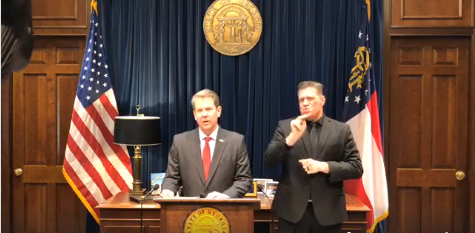
Governor Brian Kemp issued an executive order Saturday morning to declare a public health emergency as Georgia continues to deal with an increase in COVID-19 case and the Georgia General Assembly is set to convene for a special session early Monday morning to consider authorization and ratification of a number of provisions that coincide with declared public health emergencies, but how much authority with the Governor really have?
On Thursday, the Georgia legislature amended the FY 2020 budget to accommodate Kemp’s request for $100 million in rainy day funds to address COVID-19, though specific budget items have not been announced.
Kemp also activated 2,000 troops from the Georgia National Guard and Secretary of State Brad Raffensperger postponed the March 24th presidential preference primary election. In his Saturday morning news conference, Kemp said the declaration “will greatly assist health and emergency management officials across Georgia by deploying all available resources for the mitigation and treatment of COVID-19. If necessary, unlike other states of emergency, this declaration will allow the Department of Public Health to direct specific healthcare action in extraordinary circumstances.”
Under O.C.G.A. 38-3-51, the code section pertaining to the authority of the executive office during a public health emergency, Kemp will have the authority to:
- assume direct operational control of all civil forces and helpers in the state;
- seize, take for temporary use, or condemn property for the protection of the public in accordance with condemnation proceedings as provided by law;
- sell, lend, give, or distribute all or any such property among the inhabitants of the state and to account to the proper agency for any funds received for the property;
- issue orders for quarantines and vaccination programs by way of authorizing the Department of Public Health to coordinate all matters pertaining to the response of the state to a public health emergency without limitation;
- suspend any regulatory statute prescribing the procedures for conduct of state business if strict compliance would in any way prevent, hinder, or delay necessary action in coping with the emergency;
- utilize all available resources of the state government and of each political subdivision of the state as reasonably necessary to cope with the emergency or disaster;
- commandeer or utilize any private property if he finds this necessary to cope with the emergency or disaster;
- compel a healthcare facility to provide services or the use of its facility if such services or use are reasonable and necessary for emergency response
- direct and compel the evacuation of all or part of the population from any stricken or threatened area
- suspend or limit the sale, dispensing, or transportation of alcoholic beverages, explosives, or combustibles
- make provision for the availability and use of temporary emergency housing
- transfer money from any available fund in the state treasury if sufficient funds are not already available;
Anyone working under the directive of the emergency declaration is free of any potential liability of their actions.
If ratified by the General Assembly, the state of emergency is in effect until the Governor finds that the threat has passed or the emergency or has been dealt with to the extent that the conditions no longer exist. If the state of emergency extends beyond 30 days, the declaration must be renewed, though the General Assembly by concurrent resolution may terminate a state of emergency or disaster at any time.
Additionally, Kemp’s declaration signed Saturday:
- directs GEMA and the Georgia Department of Public Health, among other things, to coordinate protocols, and response efforts within the state and with other states, to manage quarantine efforts, to monitor suspected cases;
- suspends restrictions on hours of commercial vehicle operation and vehicle height/weight/length thresholds;
- authorizes the Georgia Composite Medical Board and Georgia Board of Nursing to grant temporary licenses to applicants who are in good standing in other states to assist in addressing healthcare needs;
- mandates that all local and state entities comply with the Governor’s order.
Kemp said Saturday that Lieutenant Governor Geoff Duncan and Speaker David Ralston have both expressed their full support for his request. Both the Georgia House and the Georgia Senate will have to ratify the resolution for it to take full effect.
The number of cases in Georgia as of noon on Sunday, March 15th was 99, with one death.
In a news conference Saturday morning, Kemp said the state has a duty to remain vigilant, especially for the most vulnerable populations. “We have increased capacity at our state lab to allow for coronavirus testing of specimens. Right now, we are processing 100 specimens per day, and by the end of next week, we will double it to 200 per day with the addition of new equipment and staff,” Kemp said.
You can read Kemp’s complete executive order below.
Jessica Szilagyi is a former Statewide Contributor for AllOnGeorgia.com.

1 Comment
Leave a Reply
Cancel reply
Leave a Reply

Bulloch Public Safety
02/23/2026 Booking Report for Bulloch County

Chattooga Local News
Postal Service Celebrates Bruce Lee

Bulloch Public Safety
GDOT: Traffic Impacts for the I-16 at I-95 Improvement Projects Through February 28

Bulloch Public Safety
01/26/2026 Booking Report for Bulloch County

Bulloch Public Safety
02/09/2026 Booking Report for Bulloch County

Bulloch Public Safety
02/16/2026 Booking Report for Bulloch County

Bulloch Public Safety
02/02/2026 Booking Report for Bulloch County

Bulloch Public Safety
02/20/2026 Booking Report for Bulloch County







Rick Day
March 16, 2020 at 11:41 am
1. Sounds a lot like Socialism to me, and
2. I wondered when those FEMA camps the right whined about for 8 years was finally going to show up. Thanks, Obama!
3. Thanks for the fish!